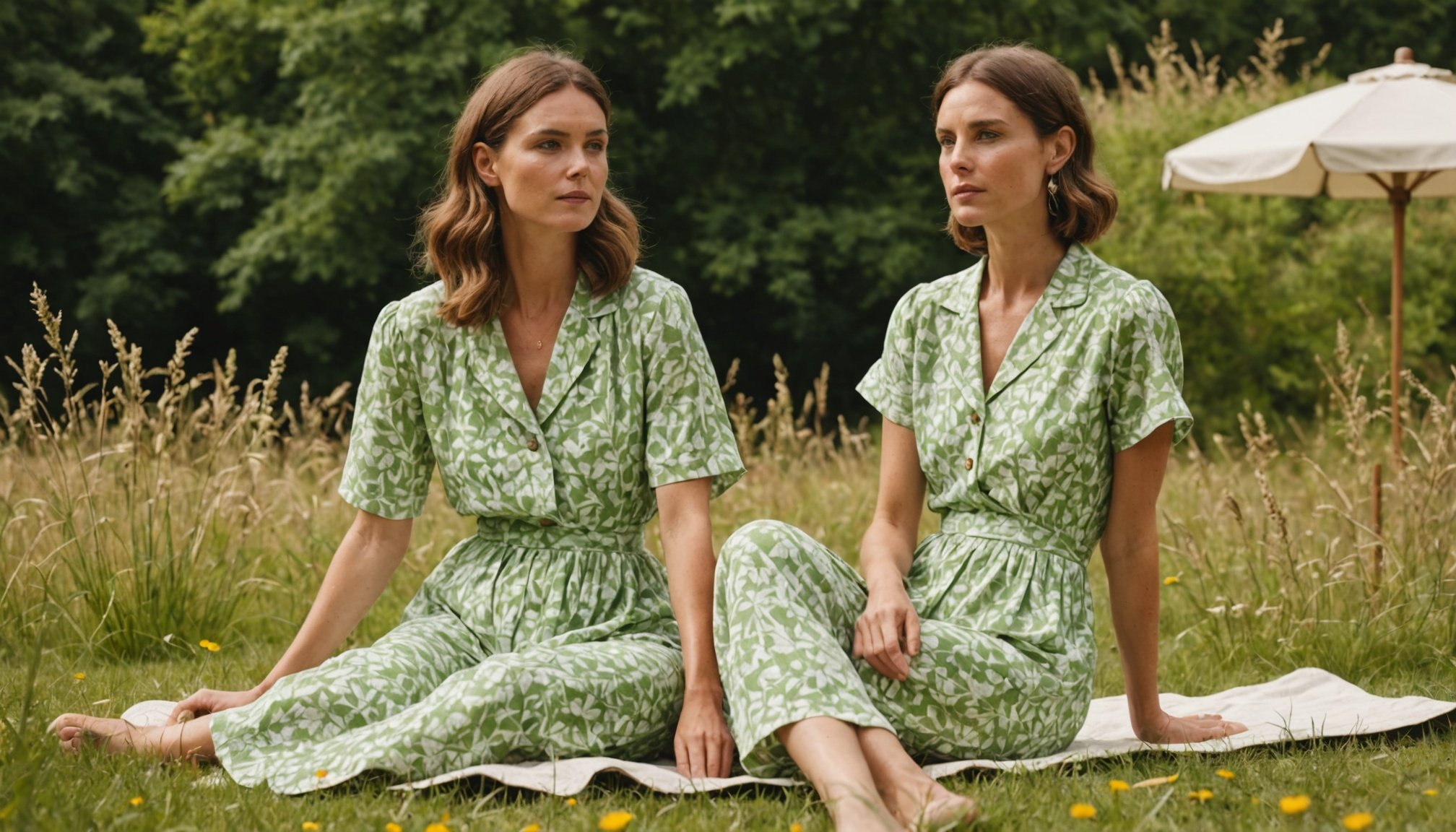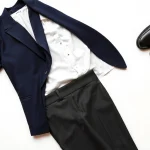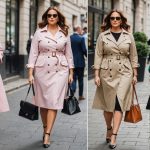Overview of Eco-Savvy Fabrics
Selecting eco-friendly fabrics is crucial for staying comfortable during humid heatwaves. These materials offer breathability and good moisture-wicking properties, which are vital in combating sweltering conditions. Various types of fabrics excel in these areas, providing comfort and sustainability.
Breathable materials like organic cotton and linen allow air circulation, reducing the discomfort of sticky, warm weather. They effectively pull moisture away from the skin, aiding in evaporation and cooling. On the other hand, fabrics that trap heat and moisture can intensify the stuffy sensation during a heatwave, emphasising the importance of choosing the right fabric.
Also to discover : Discover your ideal swimwear: the ultimate guide to flattering styles and maximum comfort for every body type
Sustainable fashion embraces the use of eco-savvy fabrics, contributing significantly to environmental conservation. These materials reduce the carbon footprint by employing renewable resources and avoiding harmful chemicals during production. The commitment to sustainability ensures not only personal comfort but also the health of our planet.
By prioritising eco-friendly fabrics, consumers actively support a fashion industry that cares for the earth, providing quality garments that maintain coolness and comfort. Opting for products made from such fabrics promotes both personal well-being and an ethical lifestyle, thereby encouraging an eco-conscious approach to clothing choices.
Additional reading : UK Women’s Top Picks: Discover the Hottest Non-Invasive Facial Lifting Techniques
Key Properties of Fabrics to Enhance Comfort
Understanding the key properties of fabrics is essential for enhancing personal comfort during humid heatwaves. Breathability plays a significant role in this context. Breathable fabrics, such as organic cotton and linen, enable effective air circulation. This capability reduces the sticky, uncomfortable sensation often experienced in hot weather by allowing trapped heat to escape.
Moisture management is another crucial factor. Fabric technologies designed for moisture-wicking help manage sweat by drawing moisture away from the skin. This ensures a cooling effect and prevents the fabric from clinging uncomfortably. Effective moisture-wicking is especially beneficial in maintaining dryness and comfort when temperatures soar.
The weight and texture of fabrics also influence comfort levels. Lightweight fabrics feel less oppressive and allow for more freedom of movement, enhancing breathability even further. Additionally, the texture of the fabric can affect how it interacts with the skin. Softer textures provide a more pleasant sensory experience when in contact with the body.
Choosing fabrics with these properties ensures a delightful balance between comfort and practicality, allowing individuals to confidently navigate hot conditions without compromising on style or environmental values.
Recommended Eco-Savvy Fabrics
Choosing the right eco-savvy fabrics not only enhances comfort but supports sustainable textiles. These eco-friendly options balance comfort with ethical fashion practices, providing a perfect match for hot weather.
Organic Cotton
Organic cotton is highly favoured for its refreshing comfort and environmental benefits. Unlike conventional cotton, organic forms use less water and avoid harmful chemicals, reducing heat retention significantly. Brands like Patagonia and People Tree are notable for incorporating organic cotton into their eco-conscious collections, offering a cooler, breathable alternative for humid climates.
Linen
Linen shines as a superior choice for those seeking breathable clothing. Its lightweight, natural fibres allow excellent air circulation and moisture absorption, ideal for regulating body temperature. Stylish picks from brands like Eileen Fisher and Sezane showcase linen’s timeless appeal without compromising on comfort, even in scorching conditions.
Tencel (Lyocell)
Known for advanced moisture management qualities, Tencel excels in hot weather attire. Its eco-friendly production process emphasizes sustainability, earning Tencel recognition as a smart fabric choice. Products such as those from Tentree and Allbirds exemplify Tencel’s effectiveness in keeping wearers cool and dry, reinforcing its role in sustainable fashion.
Styling Tips for Hot Weather Outfits
Navigating the fashion maze of heatwaves requires smart summer styling choices. Focus on layering breathable fabrics, which not only maintain a chic appearance but offer practical solutions to heat discomfort. Opt for lightweight clothing that aids air circulation, helping you stay fresh and comfortable throughout the day. When layering, consider using eco-friendly materials like organic cotton or Tencel for base layers, as they wick moisture from the skin efficiently.
Choosing the right colour palette also significantly affects how heat is absorbed. Light shades such as whites, pastels, and neutrals reflect sunlight, keeping you cooler compared to dark hues. By integrating these tones into your daily outfits, you can enhance comfort while still expressing personal style.
Incorporate eco-savvy fabrics into versatile outfits suitable for various occasions, from casual outings to formal gatherings. For instance, a blend of linen shirt and organic cotton trousers creates a sophisticated look while ensuring breathability. Pair these with Tencel accessories to reinforce a sustainable approach to fashion.
By considering these styling tips, individuals can curate a wardrobe that is both fashion-forward and adept at tackling high temperatures, all whilst supporting sustainable fashion.
Sustainability and Ethical Considerations
In today’s fashion world, embracing eco-conscious fashion is more crucial than ever, serving as a beacon for sustainable practices and ethical consumption. The production of conventional fabrics often leads to significant environmental degradation, from excessive water usage to chemical pollution. By choosing eco-savvy options, consumers can drastically reduce these impacts.
Supporting ethical brands makes a tangible difference in the global effort to combat unsustainable practices. These brands typically focus on using renewable materials, minimising waste, and ensuring fair labour conditions. Notable examples include Stella McCartney and Everlane, both of which have made commitments to ethical manufacturing.
Finding trustworthy eco-friendly fashion brands requires a keen eye on product labels and brand mission statements. Certifications such as the Global Organic Textile Standard (GOTS) and Fair Trade labels serve as reliable indicators of a brand’s commitment to sustainability.
To join this movement effectively, consumers should research brands extensively, ensuring they align with ethical and sustainable goals. By making informed choices, individuals can support a fashion industry dedicated to preserving environmental resources, creating a more ethical and sustainable future.
User Experiences and Testimonials
Understanding the performance of eco-savvy fabrics in real-world scenarios can be enlightening. Customer reviews often shed light on how these fabrics fare in humid conditions, highlighting their practicality and comfort. Users report that breathable linen is particularly effective in allowing air circulation, significantly enhancing comfort during sweltering UK heatwaves. This fabric’s moisture-wicking properties aid in keeping the body cool and dry, which corroborates its benefits discussed in other sections.
Notably, users of organic cotton appreciate its soft texture and cooling feel, often preferring it over conventional cotton due to its reduced heat retention. Brands like Patagonia and People Tree receive accolades for the durability and sustainability of their garments. Customers mention a noticeable difference in temperature regulation, affirming the fabric’s suitability for hot weather.
Moreover, feedback on Tencel is overwhelmingly positive, with mention of its excellent moisture management capabilities. Users frequently commend its lightweight nature, which adds to the overall comfort. Brands including Tentree and Allbirds are highlighted for their commitment to quality, with customers appreciating the balance between eco-friendliness and practicality. These testimonials collectively endorse the efficacy of eco-savvy fabrics in tackling high temperatures while supporting sustainable fashion choices.








